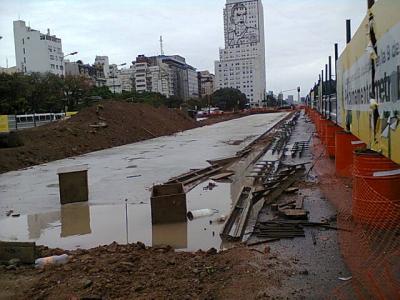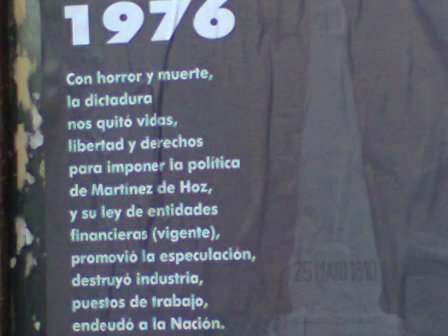Death leaves its seeds. Death is an indivisible part of life. Hugo Chávez Frías, Venezuelan military officer, baseball fan, Catholic, singer, amateur painter, avid reader, anti-imperialist and ardent exponent of Latin American unity has succumbed of cancer and left a rich yet polemical political heritage.
Latinamerica is one of the few places in the world today where phrases such as “revolution,” “change” and “socialism” are still talked about in political circles and even in the parlours of government. Chávez was the most ardent outspoken and visible spokesman for a movement that includes progressive minded leaders in Argentina, Uruguay, Brazil, Bolivia and Nicaragua.
Although Chávez was unable to break the country’s economic subordination to the U.S. (main buyer of Venezuela’s oil), during his 14 years in power he was able to give the ostracized poor majority an active partiicipation in the country’s affairs, for the first time in history.
The slogan "I am Chávez!" shouted time and again during the president's sickness and following his death clearly indicates the degree of indentification the masses feel not only for Chávez as a charismatic leader but for the the continuation of policies of a socialist nature.
Most of the new progressives in Latin America, including Chávez, have non-conventional political backgrounds: Uruguayan President José Mujica was a Tupamaro guerrilla leader and was tortured by the dictatorship in his country; Bolivia’s Evo Morales was a union leader, as was former Brazilian president Luiz Inácio Lula da Silva.
Hugo Chávez was born in 1954, the second of seven children, of mixed European, Indigenous and Afro-Venezuelan background. Dirt-floor poverty was one reason he went into the armed forces. Curiosly enough it was there that he discovered politics and Simón Bolívar, leader of the independence movement from Spain and a number of other rebel figures, such as nineteenth century peasant leader Ezequiel Zamora, in whose forces Chávez’s great-greta-grandfather had served. Shortly after his birth the CIA masterminded the overthrow of reformist minded Guatemalan president Jacobo Arbenz. Then there was the revolution of Fidel Castro in Cuba, the series of pro-U.S. anti-communists coups across the continent, the toppling of Salvador Allende in Chile...
With falling oil prices and skyrocketing corruption, underhanded deals between the establishment political parties, growing and incredible social inequality, Chávez emerged via a failed putsch in 1992, which landed him in jail but turned him into a sort of folk hero. In 1998 he participated in the presidential election and got 56 percent of the vote.
The predominantly white political establishment was shocked at seeing his dark skinned face and the increasing support he received from the destitute masses. Washington became jittery and got its hands dirty wih a coup attempt, an oil strike that destroyed the country’s economy and a blatant anti-Chavist campaign in the mass media.
Nevertheless, perhaps in part due to his military experience Chávez manoevered like a snake to embark on an ambitious program of massive social spending, and constant tug-of-war with U.S. policy in the region.
Chávez submitted himself and his program to fourteen national votes, winning thirteen of them by large margins, in perfectly transparent elections. Massive expansion of state services, healthcare, education, literacy campaigns, etc. brought in an influx of supporters from diverse social, cultural and economic groups. Grassroots orgnizations began to pop up, neighborhood councils, feminists, gays and lesbian rights organizations, economic justice activists, environmental coalitions, groups related to indigenous groups.
When Chávez came to power an estimated 26 percent of the population was in extreme poverty, an enormous number of citizens were illiterate, the economy was stagnant and the “political class” was in a state of chaos and corruption.
Unemployment has been pushed down from 15 to 7%; now only 7 percent of the population is in extreme poverty; health centers have sprung up all over the country, especially in the poor neighborhoods and illiteracy has been whacked down to size. Equally if not more important there has been an intense process of consciousness taking concerning the nature of dependent capitalism and the prospects for the construction of a “21st century socialism.” Although Chávez came to power without the backing of a political party, now he has the support of a dynamic political party with seven million members.
In accordance to the reformed constitution, the country must now go to presidential elections in a month to replace the president. The probable winner is the vice-president, Nicolás Maduro, a former transport union leader and the key force in putting together Chávez attempts to support Latinamerican integration and opposition to U.S. policies in the area by means of regional agreements such as Alba and Mercosur.
There very likely will be divergencies within the Chavist movement, which the rightwing will do everything possible to swing to their advantage. However, the increased consciousness and political participation of the outcast majority will very likely vote for a continuation and more profound implantation of the embrionic policy born under Chávez. If not, there the situation could result in a seething boiling pot whose consequences would be far reaching but impossible to predict.
Whatever happens, the dream of Latinamerican unity and the increased demands of the excluded majority are certain to continue in Venezuela and all across the continent.

